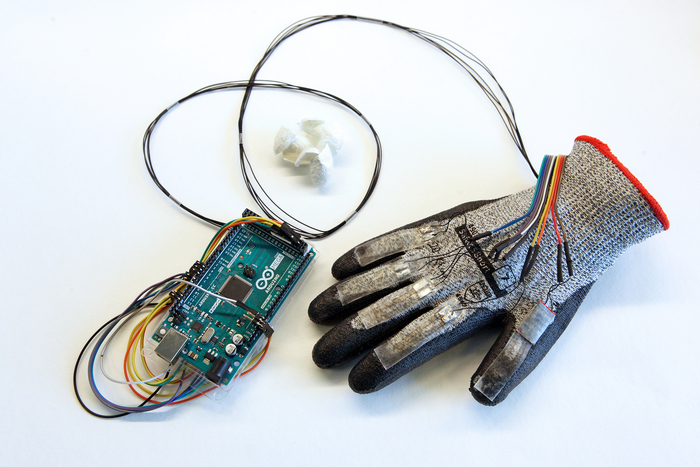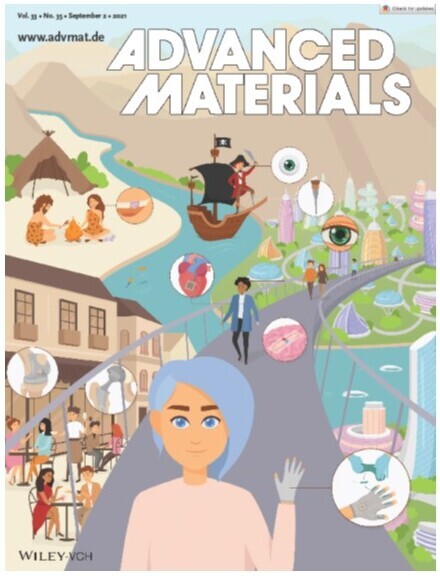After a hand injury, it is important to follow a rehabilitation programme to ensure a quick recovery and re-establish strength and function of the hand. In Denmark and Germany alone, it is estimated that almost 200,000 persons per year need such rehabilitation. A typical setup is weekly meetings with a physiotherapist and in between those visits, the patients should do exercises at home on a daily basis. However, these daily exercises are often neglected simply because they are boring due to their repetitive nature.
The technology within
Associate Professor Alireza Dolatshahi-Pirouz, Firoz Babu Kadumundi and their research team have developed a new sensor material suitable for developing such a rehabilitation glove. The material belongs to the CareGum family. This particular one is thermo-electric, based on silk and has a number of features that makes it versatile and excellent as a wearable sensor on the human body.
“We have created a new CareGum material, which is electrically conductive and thermo reversible, i.e. when you heat it, it becomes syrup-like in consistency, and when it is cold it becomes solid-like again. This property makes it readily printable. It is biocompatible and can easily be adapted to fit the human body, it is self-healable, flexible and can resist wear and tear. As a new feature it can also become woven into textiles and 3D printed, and finally it is also cheap to produce”, Alireza Dolatshahi-Pirouz clarifies.
From research towards a company
MSc Biomedical Engineering student Amber Ravn Labuz and Alex (Efstathios) Voinas, who studies MSc Human-Centered Artificial Intelligence, work on a solution to make rehabilitation via physiotherapy more fun and exciting with an electronic glove. Last year they entered the X-Tech competition, where they started working together with Associate Professor Alireza Dolatshahi-Pirouz and his BioEngine team at DTU Health Tech to make a prototype and a business plan. After the X-Tech course ended, they have decided to keep going.
“Basically, we have a glove with sensors on each finger. The sensors are made of a silk-based CareGum material, making them extremely environmentally friendly and cheap to produce. And through these we can track hand movements. We saw that it could be useful for physiotherapy treatment. The idea behind the start-up is to use the glove for rehabilitation exercises at home in a fun way by playing games”, Amber Ravn Labuz, who is in charge of the management and marketing efforts in the project, explains.
"We hope we can help people, and make it easier and more fun to do rehabilitation exercises at home. "
Students Amber Ravn Labuz and Alex Voinas
Alex Voinas, who is in charge of product and software development development, adds, “We can also keep track of the rehabilitation progress, and register improvements in the patient’s range of movement. And the data can be sent directly to the physiotherapist so they can follow the progress continuously.”
The strategy is to hook the glove up to existing games that people already play on their mobile phones and incorporate the rehabilitation exercises in the game. Down the line, they want to have different games correlating to specific degrees of rehabilitation and required exercises. “Right now we have one simple game – Flappy Bird – but we want more!” Amber Ravn Labuz says.
Close collaboration
The students work closely with the research team in the BioEngine group, a positive experience all around.
“One key word for me is that the professors are approachable. In my experience, this is not the norm in other places. The open door policy at DTU is a good thing”, Alex Voinas says.
Amber Ravn Labuz adds, “I like it, it is nice to have a relationship where you can learn and discuss with the professors instead of just sitting in a lecture hall. Having the professors there and willing to put their face onto the company is extremely great for us and hopefully for them as well.”
”I think Amber and Alex have done really well, they have been very professional, and their efforts and contributions have been very valuable in terms of commercialising our technology. In general, I think DTU has excellent programmes for researchers to collaborate with others to get our technology from the lab to the patients and consumers”, Alireza Dolatshahi-Pirouz concludes.
When asked about their hopes for the future, the students say, “We hope we can help people, and make it easier and more fun to do rehabilitation exercises at home. And of course, we hope that the idea will catch the attention of potential investors. The first step will be to enter student start-up competitions to gauge interest.”

The sensor material used in the glove is extracted from naturally available silk cocoons. The glove itself consists of five channels, each one attached to one of the five fingers of the hand. Whenever a sensor is deformed a resistance change occurs, which subsequently is converted and transmitted to a computer via an Arduino board. (Photo by Jesper Scheel)
Top image: Amber Ravn Labuz plays Flappy Bird with the electronic glove (Photo by Jesper Scheel)
For further details on the CareGum technology read the recent paper in Advanced Materials.
The article was also selected for the inside back cover (volume 33, issue 35).
